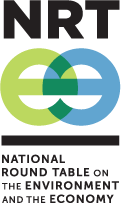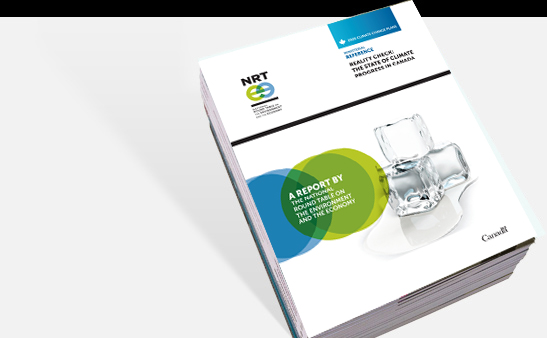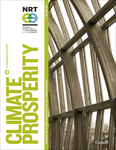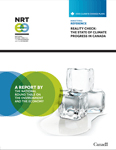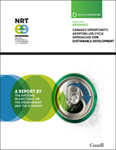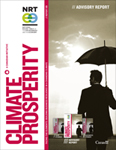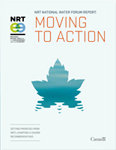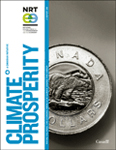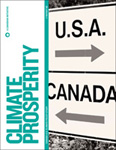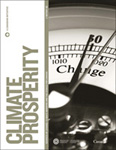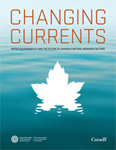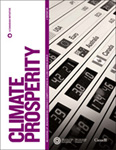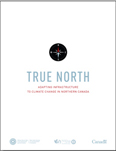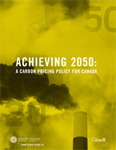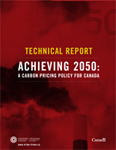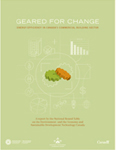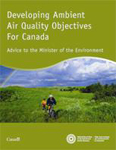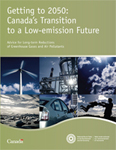Parallel Paths: Canada-U.S. Climate Policy Choices – Research
With Parallel Paths, the Round Table has undertaken the most comprehensive analysis yet published on the economic risks and opportunities for Canada of climate policy in the context of the Canada-United States relationship. Thinking about how best to harmonize Canadian climate policy with that of the U.S. allows us to design a system that manages competitive risks, achieves real emission reductions, and drives the development of new clean energy and low-carbon technology. The NRT’s original modelling research and comprehensive scenarios analysis in this report explores the economic and environmental implications for Canada of leading, lagging, and harmonizing with the U.S. on climate policy.

Competitiveness concerns loom large in Canadian climate approaches due to the integrated nature of our energy, investment, and trading relationship with those of our largest economic partner, the United States. A shift to harmonization and alignment of Canadian climate policies with those of the United States, from greenhouse gas emission-reduction targets to vehicle fuel-emissions standards, has been the result.
But what does this really mean for Canada’s own longer-term climate policy? What are the environmental and economic implications of harmonized or aligned Canadian policies with those of the United States? What does delay and uncertainty in U.S. climate policies imply for our own policy choices? What options need Canada consider if the U.S. doesn’t move?
There are economic risks from independent Canadian action, but there are also risks to inaction. So, how can we best implement climate policy in Canada to achieve our environmental goals at least economic cost in the short term, while preparing Canada’s economy for a clean energy and low-carbon economic future? In short, is there a made-in-Canada, transitional path forward, and what might it look like?
This report examines these questions. It is the third report of the National Round Table on the Environment and the Economy’s (NRTEE or Round Table) Climate Prosperity series exploring the economic risks and opportunities for Canada resulting from a changing climate and from the global transition to a low-carbon economy. In this report, the NRTEE explores the risks and opportunities for Canada of designing and implementing climate policy in light of possible U.S. climate policy. The report seeks to identify a policy option for Canada to minimize risks — both environmental and economic — while seizing the opportunities to set Canada on a path toward long-term climate prosperity. It considers how this transitional option can be usefully integrated into existing Canadian climate policy directions and ambitions if the U.S. does not move, but also considers how best to position Canada if the U.S. does ultimately move forward.
The objectives for this report are two-fold:
// ASSESS the implications of U.S. climate policy choices for Canada and for various Canadian climate policy options.
// IDENTIFY policy options leading to long-term emission reductions while managing the economic risks for Canada of adverse national, regional, and sector-level impacts from both potential U.S. and domestic policy choices.
The analysis and findings from Achieving 20502 form a foundation for this report and provide some of the architecture for the policy options it examines and recommends. This report digs deeper with a specific focus on the interaction between Canadian and American climate policy choices and what they could mean to Canada’s economy and its ability to meet its GHG emission reduction targets. But the international policy and political landscapes since Copenhagen have shifted and continue to evolve, both here and in the United States. A major challenge for our analysis was therefore to adapt and revise our approach to ensure it was current and relevant. With continually changing U.S. legislative proposals and evolving Canadian targets and policy in response, we designed a research framework to account for both uncertainty from the U.S. and uncertainty about what this might mean for Canada’s own policy choices.
